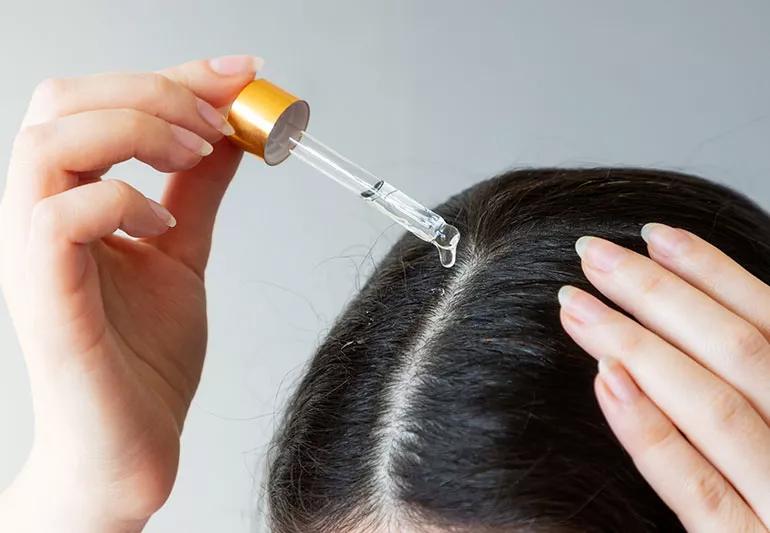Hair type, medical conditions, age and ethnicity all might play a role

Image content: This image is available to view online.
View image online (https://assets.clevelandclinic.org/transform/22f47a1a-a2bc-4c00-a6d9-2093a1d59026/Hair-Oiling-1382012915-770x533-1_jpg)
Person applying hair oil to scalp.
From shampoos to heat styling, your hair can go through a lot. Many of us are always looking for ways to give our locks some much-needed R&R.
Advertisement
Cleveland Clinic is a non-profit academic medical center. Advertising on our site helps support our mission. We do not endorse non-Cleveland Clinic products or services. Policy
But could it be that your hair needs an oil change?
Hair oiling is an ancient practice used to strengthen and moisturize hair — and many believe that it’s an important step for making sure your strands get a good balance of vitamins.
But is oiling your hair right for you? Dermatologist Shilpi Khetarpal, MD, explains what hair oiling is, how to do it and what technique is best for you.
Hair oiling is a practice where natural oils are spread or massaged throughout your hair to increase shine, moisture and overall health. This beauty routine has its roots in Ayurvedic medicine and Indian tradition, but has gained traction recently in the world of natural hair care.
If you Google the term, a couple of different methods pop up. Some recommend applying natural oils to your scalp, while others suggest putting it on the ends of your hair to keep it hydrated and hide split ends.
Similar to our skin, our hair needs a good balance of oils to keep it healthy and happy.
According to proponents of this practice, hair oiling’s main goal is to hydrate your hair and make up for any vitamins or minerals your hair may be missing after repeated washing.
Some benefits of hair oiling include:
The secret to having silky hair that would make Rapunzel herself jealous? Hydration!
Advertisement
A 2015 study found that oils can help revive hair with a much-needed moisture boost. Another study from 2021 found that coconut oil strengthens hair fibers. Especially for hair that’s been affected by intense styling and heat damage, hair oiling can fill in some gaps to keep it moisturized and, in turn, silky smooth.
If you haven’t had a chance to visit your salon in a while, there’s still a way to conceal those split ends. Add some natural oils to the ends of your hair to help visually clean them up, while adding a bit of moisture in the process. Remember, though, this is only a temporary fix.
Heat damage doesn’t just come from your straightener or curling iron. Protecting your hair from the sun’s rays is important to keep your hair from getting too dry or frizzy over time. Research suggests that almond oil’s moisturizing properties may create a protective barrier against the sun’s UV rays.
There’s plenty of advice out there for hair oiling. Chances are, most of the articles and social media posts involve applying oil directly to your scalp. But this particular method of hair oiling may not work for everyone.
Depending on your hair type, hair oiling advocates claim that it may improve your scalp’s health if used correctly. A recent 2021 study found that coconut oil in particular has a positive effect on the scalp.
Another study suggests that hair oiling can even prevent dandruff. But other experts, such as Dr. Khetarpal, advise against putting oil directly on your scalp. It turns out, hair oiling could actually put you at higher risk for seborrheic dermatitis — essentially, dandruff. Overall, it’s best to steer clear of oiling your scalp.
No matter the beauty routine you’re following, there isn’t a one-size-fits-all for every type of hair. Dr. Khetarpal points out that hair oiling isn’t going to affect each head of hair the same way.
“Certain hair types can benefit from oiling more than others,” he says. “People with dry, coarse tightly curled hair can benefit from oiling, while others with fine, straight hair may find oiling weighs their hair down too much. Those who are prone to dandruff should avoid all types of oils.”
Whether or not hair oiling will work for you may depend on:
There’s a variety of different natural oils to choose from. It’s usually recommended that you use natural oils if possible to avoid any additives or chemicals that may irritate your hair.
Here are some natural oils to consider:
Advertisement
When it comes to applying oil to your hair, a little bit goes a long way.
“Oils can be applied to the ends of the hair, and then washed out after several hours,” notes Dr. Khetarpal. “It’s best to apply to dry hair and use a small amount.”
Try this method on a weekly basis:
All in all, it’s good to start slowly when exploring different hair routines. Remember, not every head of hair is the same, so oils — as natural as they may be — can yield different results for everyone.
Advertisement

Delivered every Tuesday!
Sign up for our Health Essentials emails for expert guidance on nutrition, fitness, sleep, skin care and more
It's a letter about the news!

Every two weeks once
Sign up for our Health Essentials emails for expert guidance on nutrition, fitness, sleep, skin care and more.
Learn more about our editorial process.
Advertisement
Studies show that the herby oil can lead to longer, healthier hair
Though this is a myth, the ‘stubble stage’ struggle is real, but moisturizing can help
It’s not a substitute for good old washing and rinsing
Learn the reason why it’s a part of many beauty routines
From bleaching to brushing tips, here's your guide to cold weather hair care
The short answer from a dermatologist
Don’t let harsh chemicals damage skin or hair
Pantothenol is a powerful moisturizer and can help repair damaged skin and hair
Type 2 diabetes isn’t inevitable with these dietary changes
Applying a hot or cold compress can help with pain
Pump up your iron intake with foods like tuna, tofu and turkey